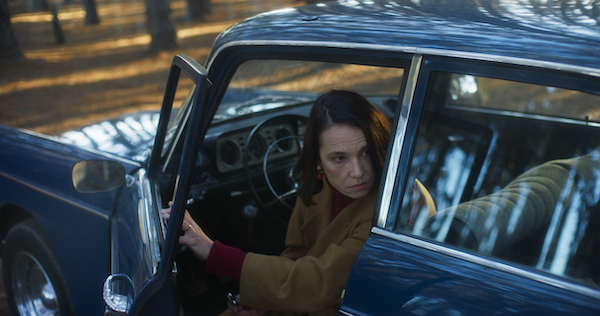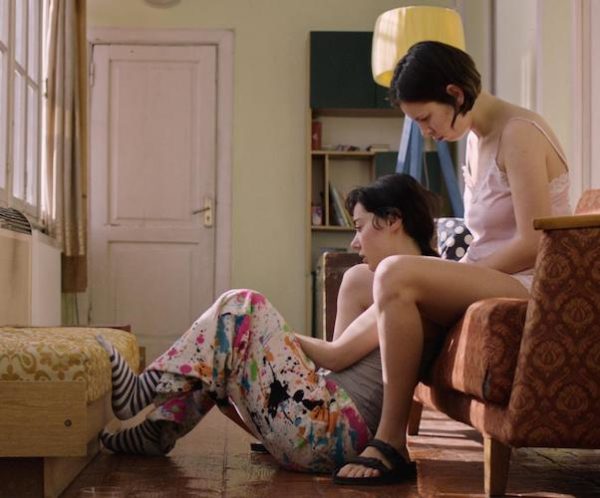Film Review: London Film Festival, Dispatch #1 — “1976” and “A Room of My Own”
By Peg Aloi
Reviews of two standout films from the 66th London Film Festival — one of the most dynamic festival programs in recent memory.
2022 marks the 66th London Film Festival in association with the British Film Institute, and this year’s event was a full on in-person event, with a digital viewing library that offered access to a limited number of films from the program. The slate of high profile international films alongside daring documentaries, innovative shorts, and a rich variety of dramatic and comedic offerings made this one of the most dynamic festival programs in recent memory. The only film I was able to attend in person was Rubin Ostlund’s Palme D’or winner Triangle of Sadness (in the Royal Festival Hall, a huge elegant venue, packed to the gills), but the digital viewing library offered opportunities to take in some excellent films. The digital access has been improved since last year; it allowed for much longer viewing windows. It would be terrific if film festivals offered better digital and remote viewing options. We’re clearly still in the full throes of a worldwide pandemic, and in-person attendance presents a risk for everyone, particularly those with compromised immunity. Sundance got it right: wide access for both press and general public, and an excellent online interface.

Aline Küppenheim in Manuela Martelli’s feature debut 1976.
The first entry I saw turned out to be one of my favorites: Manuela Martelli’s 1976, a film about the changing political landscape in Chile under Pinochet’s regime. The eyes and ears of the story is Carmen (played by Aline Küppenheim), a nurse in the middle of renovating her country home one winter while her husband, a doctor, works in a state run hospital. From her first day in the seaside village, Carmen encounters a number of situations that tie into the volatile political situation converging around her. In the very first scene, she has just arrived in town and asks for a paint color to be mixed at a local hardware store. The perfect shade of peaceful sunset pink she chooses is an ironic contrast to the tension of a violent arrest that takes place nearby. That pink spills over into the opening titles, readying the viewer for 1976‘s strong symbolic color palette, as well as its lush but authentic mise en scène.
Miguel, an elderly priest and long time friend, comes to see Carmen the morning after her arrival: there is warmth and affection between them. He asks her to help a young man in a nearby village who’s been shot in the resistance. Miguel explains that the wounded rebel cannot safely enter a hospital. An erratic, but oppressive, military occupation seems to be taking place. Carmen responds calmly to the request and agrees to help, despite how it makes her journeys to and from the village dangerous. Seemingly harmless encounters with other villagers take on a quietly menacing air. As time goes by, Carmen becomes more aware of the volatility of the situation as well as bolder in her determination to not submit to it. The secretive measures Carmen and others must take in order to assist the rebel mercenaries makes it clear that brutal operatives and military thugs are waiting in the shadows to crush any forces of resistance. Küppenheim gives a quietly-mesmerizing performance.
1976 pays powerful homage to this crucial period in Chile’s history. Martelli’s sure-handed direction makes impressive use of vibrant visuals, evocative sound design, and a meticulously detailed setting, from cars and costumes to technology and architecture. Maria Portugal’s score, in particular, captures the era perfectly: it is subtle and evocative, adding immediacy and warmth to this high tension political narrative about the machinations of a police state and those who resist it.

A scene from Ioseb “Soso” Bliadze’s A Room of My Own.
Georgian filmmaker Ioseb “Soso” Bliadze’s debut feature Otar’s Death won a prestigious award at the Karlovy Vary film festival in the Czech Republic in 2021. His second feature, A Room of My Own, is a contemporary story set in Tbilisi, Georgia, a rather dreary city where the pandemic is visibly present (people wear masks in shops and on public transport), and everyone seems to be struggling financially. Tina (Taki Mumladze, who also co-wrote the screenplay with Bliadze) is looking for a short-term living situation while she waits for her boyfriend to join her. She has left her husband and her family has rejected her because she cheated on him. But Tina seems cheerful enough and optimistic. Megi (Mariam Khundadze) is planning to move to New York soon. She is clearly more sophisticated than Tina, and has an active social life, going clubbing and partying with friends. Megi is annoyed to find out Tina is only planning to stay a short time, but allows it. After her first night in the apartment, Tina finds Megi lying on the floor, unconscious and briefly unresponsive; she revives her and learns Megi has a health condition, although she mostly ignores it. Things are civil but tense between them. Eventually, Tina’s kind gestures (making them both soup for dinner) encourage Megi to include her new roommate in her social circle. Both young women are financially unstable, borrowing money from others to pay the rent. Tina says she’s never had a job and Megi encourages her to get one.
Tina’s reunion with her boyfriend doesn’t go as planned. Her future seems uncertain and the two women grow closer. The result is that they appear to gradually trade roles: Megi becomes more nurturing and Tina more world-weary. This is a gentle, nuanced, and moving film, with artful touches of moody lighting. The two fine young actresses create a powerful emotional reality, and the film portrays a very realistic and personal view of the troubled city and its embattled but resilient citizens.
Note: my first two films were quite low-key in comparison to some of the outrageous social satire on display at this year’s festival in such movies as Triangle of Sadness, Sick of Myself, and The Store. More to come in my next dispatch!
Peg Aloi is a former film critic for the Boston Phoenix and member of the Boston Society of Film Critics. She taught film studies in Boston for over a decade. She writes on film, TV, and culture for web publications like Time, Vice, Polygon, Bustle, Mic, Orlando Weekly, and Bloody Disgusting. Her blog “The Witching Hour” can be found on substack.
Tagged: 1976, A Room of My Own, Aline Küppenheim, Ioseb “Soso” Bliadze, London Film Festival
